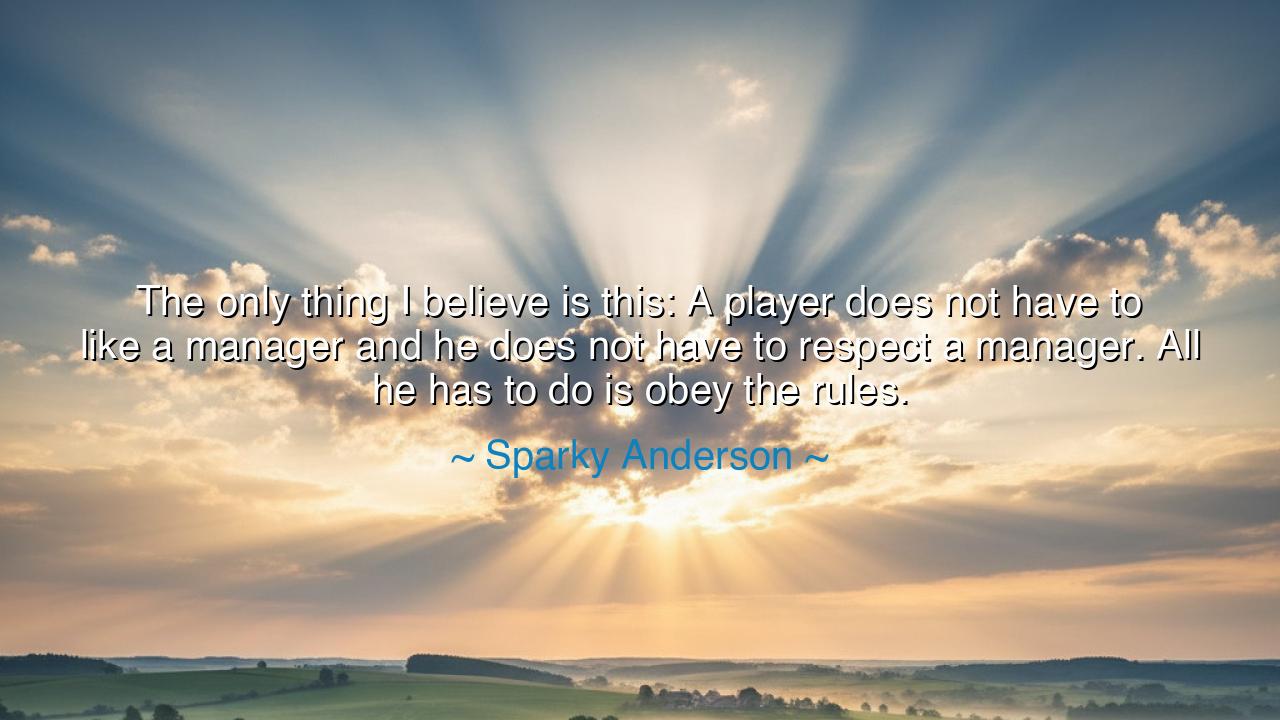
The only thing I believe is this: A player does not have to like
The only thing I believe is this: A player does not have to like a manager and he does not have to respect a manager. All he has to do is obey the rules.






In the blunt and uncompromising words of Sparky Anderson, there is the voice of a leader who has lived among men and mastered the art of command: “The only thing I believe is this: A player does not have to like a manager and he does not have to respect a manager. All he has to do is obey the rules.” These words may strike the ear as harsh, but beneath their stern surface lies a deeper truth — one forged in the fire of leadership, discipline, and purpose. Anderson, a titan of baseball and a philosopher of teamwork, understood something ancient and enduring: that harmony in human endeavor is not born from affection or even admiration, but from order, duty, and shared commitment to principle.
The meaning of this quote cuts to the heart of leadership and obedience. In a world filled with egos, passions, and differing visions, Anderson reminds us that feelings are fleeting, but structure endures. A team, whether on the field, in the ranks of an army, or within the walls of a family, cannot survive on sentiment alone. The bonds that hold it together are forged in respect for the rules — the invisible threads of conduct that preserve unity and purpose. To like a leader is a luxury; to follow the rules is a necessity. The wisdom of these words lies in their focus: the acknowledgment that greatness arises not from personal comfort, but from collective discipline.
The origin of this statement is rooted in Anderson’s long and storied career as a Major League Baseball manager — one of the most successful in history. Known as “Captain Hook” for his decisive moves with pitchers, he managed both the Cincinnati Reds and the Detroit Tigers, guiding them to multiple championships. In these crucibles of competition, Anderson faced teams composed of diverse personalities — fiery, proud, sometimes rebellious. He learned early that not every player would love him, nor even agree with him, but so long as they obeyed the rules of the game and played with discipline, the team would thrive. His leadership was not built on charm, but on clarity — the unyielding belief that the foundation of excellence is order.
History has shown us this truth in many forms. Consider the Roman legions, the most formidable fighting force of the ancient world. They were not held together by affection for their generals or personal admiration for Caesar’s every decision. They were bound by discipline — by rules that governed every act, every movement, every heartbeat of their collective life. The legions conquered nations not through affection, but through obedience. Their victories, like Anderson’s teams, were not the product of sentiment but of structure — the unspoken agreement that the success of the whole must outweigh the feelings of the individual.
And yet, there is something profoundly human in Anderson’s words. To say that a player need not like or even respect his manager is not to devalue emotion, but to elevate the principle of duty. In life, there will be times when we serve under those we do not love, when we follow leaders whose manner offends us or whose choices we question. Yet in those moments, the test of character is not how we feel, but how we act. The measure of maturity is obedience to what is right, not indulgence in personal pride. The one who obeys the rule of order — even amid doubt — contributes to the greater good. The one who rebels for vanity’s sake weakens all.
The emotional power of this truth can be seen in the story of General Dwight D. Eisenhower on the eve of D-Day. As he prepared to send thousands of soldiers into the storm of Normandy, many of his officers questioned his decisions. Some disliked him; others doubted him. But Eisenhower did not ask for affection — only obedience. And because they obeyed — because every man, from general to private, honored the rules of discipline — the mission succeeded, and history was changed forever. Anderson’s creed echoes that same principle: leadership demands order more than affection, and progress is born not of comfort, but of commitment.
The lesson of Sparky Anderson’s words is as practical as it is eternal: do not measure your worth or your duty by how you feel toward authority. Measure it by your integrity, by your loyalty to the rules that preserve harmony and purpose. Whether in work, family, or nation, do not seek constant approval or affection, for these are fleeting. Seek to understand the structure that binds your world together — and honor it, even when your heart resists. In this way, you build not only discipline, but greatness.
So let the teaching of Sparky Anderson be remembered: order precedes success, and duty transcends emotion. The wise leader does not demand to be loved; he demands to be followed in accordance with the rule. And the wise follower does not need affection to give his best; he needs only conviction that the rules serve a purpose greater than himself. For love fades, respect wavers, but obedience to principle endures — and in that endurance, both leader and follower find victory.






AAdministratorAdministrator
Welcome, honored guests. Please leave a comment, we will respond soon